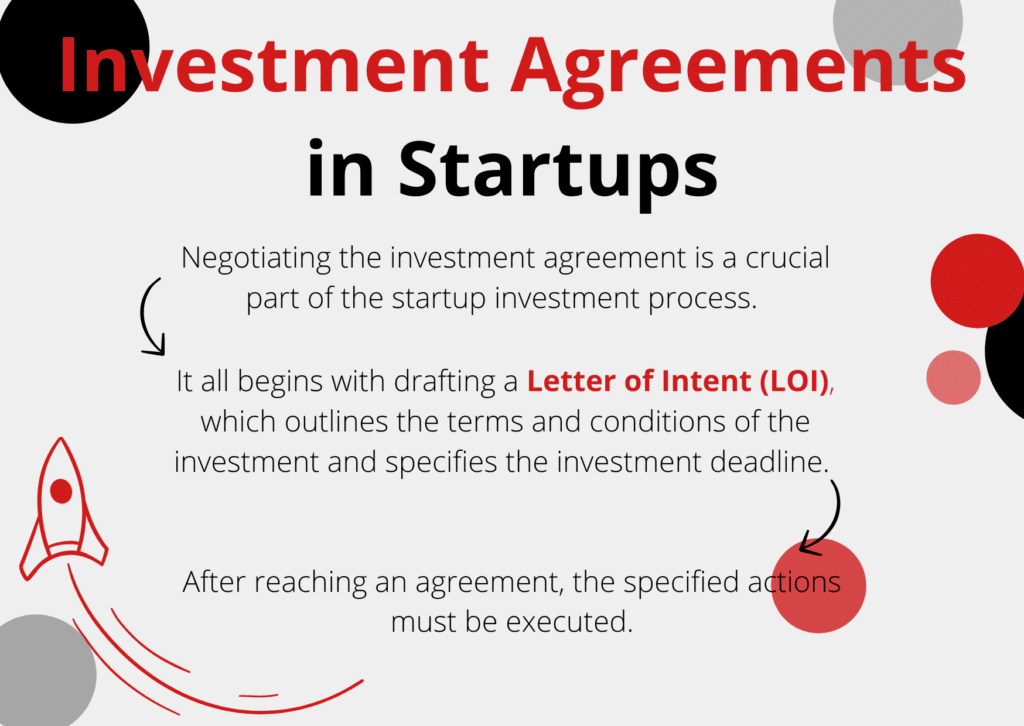One stage in the development of a startup involves reaching out to potential investors. These investors can either be private, managing private capital, or those who fund themselves with public capital.
So, if you want to learn more about investment agreements, keep reading!
Stages of the Investment Process
Negotiating the investment agreement is a crucial part of the startup investment process. It all begins with drafting a Letter of Intent (LOI), which outlines the terms and conditions of the investment and specifies the investment deadline. After reaching an agreement, the specified actions must be executed. This includes increasing the share capital by issuing new shares and updating the entrepreneur’s register.
An investment agreement stands as one of the most pivotal documents a startup can sign. As the CEO of a startup, it’s important to remember that by entering into this agreement, you are essentially selling a portion of your company. However, the payment goes directly to the company itself, not to you as a shareholder.

A Long-Term Approach to Negotiating Investment Agreements
Having an investor is akin to having a new partner, whose opinions and viewpoints must be taken into consideration. Establishing partnerships with investors often leads to long-term collaborations. In fact, 99% of startups that decide to cooperate with investors either extend their agreement or seek new individuals to support their business. This is a direct consequence of the attributes associated with investments made by venture capital funds and their corresponding investment cycles. Each fund operates within an active investing phase spanning several years, followed by an exit phase of similar duration, during which profits or losses are realized.
What Does an Investment Agreement Look Like?
The investment agreement will likely span several dozen pages and encompass numerous provisions. These provisions are typical for high-risk investments, particularly in the realm of startups.
As a result, seeking advice from a lawyer with expertise in this specific investment domain before engaging in contract negotiations is highly advisable. Equally beneficial is independently familiarizing yourself with the substantive and legal aspects. Understanding provisions that are generally considered non-negotiable from the fund’s standpoint, as well as those open to discussion, can prove immensely valuable.
What Should an Investment Agreement Contain?
A standard investment agreement typically includes the following provisions:
- Introduction
- Definitions: Clearly defined terms and concepts.
- Investment Rules: Outlining the desired capital structure of the company post-investment, specifying the investor’s contribution amount, and establishing guidelines for the investor’s acquisition of new shares.
- Employee Share Option Programs (ESOP): Rules governing the implementation of share option plans for employees within the company.
- Anti-Dilution Clause: Safeguarding the investor against dilution of their ownership stake.
- Corporate Governance: Establishment of rules for the functioning of the general meeting, supervisory board, and management board.
- Share Disposal: Guidelines for the sale or disposal of shares.
- Preemptive Right: Definition of the investor’s right to purchase additional shares before others.
- Tag Along: Allowance for the investor to join in the sale of shares initiated by other shareholders.
- Drag Along: Granting the right to compel other shareholders to participate in a sale of shares.
- Lock-Up: Restriction of the sale of shares for a specified period.
- Non-Competition and Fiduciary Duty: Outlining commitments to refrain from competition and to act in the company’s best interest.
- Right of Repurchase and Reverse Vesting: Addressing the rights of the company and investor regarding share repurchases and vesting schedules.
- Party Liability: Determination of the liability of each party involved.
- Contract Expiry: Clarification of the termination conditions of the agreement.
- Confidentiality: Stipulation of rules regarding the handling of confidential information.
It’s important to note that the specifics of these provisions can vary depending on the agreement and the context of the investment. Consulting legal professionals with expertise in startup investments is advised to ensure the clarity and effectiveness of these provisions.
If you have any other questions related to startups or outsourcing, feel free to contact us! Also, visit our YouTube Channel and listen to our podcast, “Startup Stories,” where CEOs of startups share their experiences!
